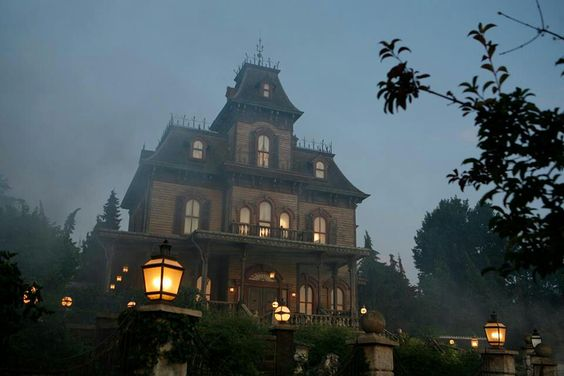“To learn what we fear is to learn who we are. Horror defies our boundaries and illuminates our souls.”
written by Ollie
Largely regarded as one of the greatest horror novels of all time Shirley Jackson's 'The Haunting Of Hill House' perfects and modernises the conventions of haunted-house stories. Jackson masterfully blurs the lines between 'the haunted house' and 'the haunted housed'. The house itself is 'not sane' but neither are its inhabitants, which allows Jackson to explore the deepest shadows of the human psyche.
However, beyond the banging doors and blood-written messages of Hill House an even darker terror resides, the terror of realising you are queer in a world where queerness means isolation. exploring the genuine fear experienced by individuals who identified as queer during the 1950s. A time when being gay was at best a life sentence of exclusion and at worst a death sentence.
In 'The Haunting Of Hill House', homosexuality surpasses mere subtext. It is an essential and inherent aspect of the novel's narrative. In fact, the most petrifying element in the novel is the nuclear family structure. And the lack of belonging that confronts those who cannot conform to it.
The novel is rife with characters who have been ostracised from society. Before the novel's main events take place, the house is left to the female 'companion' of the previous lady in a will. The previous owner's family cannot grapple with the fact that the house would be left to such a 'companion' and the hatred from the family eventually leads to the 'companion's' suicide. The queer reading of this event is clear; the family is unable to come to terms with the lady of the house's lesbian relationship with her companion and suggests foul play. Tormented by the discrimination of the town folk the 'companion' ends her own life because there is no place for her in society. This backstory sets the stage for the main action of the play which follows similar themes of ostracisation and the inability to adhere to the expectation of society.
Theodora is presented as an 'other' from the start. It is clear that she doesn't fit into the mould of society not only due to her supernatural powers but also due to her relationship with her 'roommate' whose gender Jackson intentionally leaves anonymous. Outgoing, enigmatic and liberated Theodora is a foil to the novel's hermetic main character who has never truly experienced freedom, nevertheless, the characters are instantly drawn to each other.
The relationship between Elanor and Theodora is one of the most confusing aspects of the novel. One scene shows intense physical intimacy between the women, as they hold hands and embrace one another in bed. The next scene shows Elanor's repulsion towards Theodora's physical advancements or her flirtations with Luke. I think that the intense vacillation between conflicting emotions in the relationship reflects the women's complicated feelings towards their own sexuality. For Elanor as much as the idea of sexual liberation excites her, it also disgusts her. This internalised abhorrence for sexual freedom stems from societal norms, women could express sexual desire let alone sexual desire for another woman. Theodora realises that Elanor will never truly be able to escape from the snares of her hetronormative mindset and so often acts vindictively, almost as a way to fend off disappointment. However, neither woman can dismiss their feelings for the other, which causes this obsessive and spiteful but ultimately romantic relationship to blossom.
The climax of the novel comes when both women are about to ask the other: 'Do you love me?'. However just as the question is about to be broached the pair stumble across a picnic in the yard. For Theo and Elanor this picnic is the most terrifying event of the novel. Not the banging of doors in the night, Not the ominous messages carved out in blood, Not even the phantom hand which Elanor grabs onto. The 'haunting' which leaves the most visceral and lasting impression on the girls is a “picnic party on the grass in the garden,” from which they could hear “the laughter of the children and the affectionate, amused voices of the mother and father.”
The apparition of a picnic in itself is definitely not the most terrifying image that appears in this book, in fact, it is almost a pastoral idyll. It is, however, what this hallucination entails which exhibits the complete terror from the women. The picnic represents the traditional family structure - the only family structure which Theo and Nell can truly envision. Suddenly any hopes of creating a family with one another are crushed - the traditional family structure has no room for gay women.
Up until this point in the novel the House has been a haven for Elanor to explore her sexual identity. Despite the danger and insanity that lurk beneath the house’s walls, Elanor is able to carve out a sort of family for herself, albeit a largely dysfunctional one. However, as Dr Montegaue’s wife arrives at the house and Luke shows increasing romantic interest towards Elanor, it is clear that hetronormativity permeates even the most secluded areas of the world. There truly is no place for a woman like Elanor who is ostracised from every family she tries to create. In the end, unable to face returning to a world that has no space for her, Elanor crashes her car into a tree, killing herself. This tragic act is her small act of rebellion because, for Eleanor, the torments of vengeful spirits and the wrath of a haunted house are more bearable than the isolation of a society of which she can never truly be part of.

Comments
Post a Comment